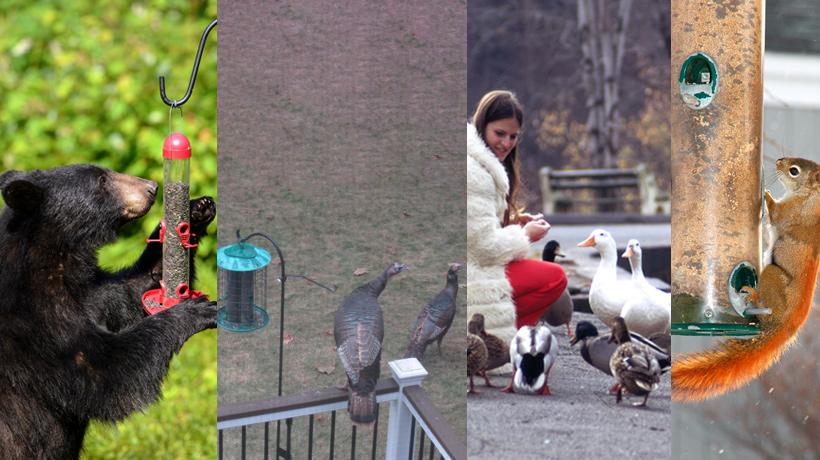Why you shouldn't feed wildlife
MassWildlife strongly advises the public to help keep wildlife WILD by not providing food for wild animals. Feeding wildlife at any time of year teaches them to rely on humans for food, which puts them at a disadvantage for survival. Feeding also unnaturally draws wildlife closer to homes and residential areas, which can cause mortality (e.g., birds striking windows, vehicle collisions, etc.) and increase negative human/wildlife interactions (e.g., turkeys can become aggressive and habituated bears can damage property). Once animals establish habituated behavior, it can be very difficult to change. Removing the supplemental food can prevent future animals from becoming habituated.
While people have good intentions, supplemental feeding of wildlife typically does more harm than good. Wild animals deal with the changing seasons by adapting their behavior, and supplemental feeding can alter those natural behaviors. While feeding wildlife is not illegal in Massachusetts, supplemental feeding can:
- Habituate animals to humans and eventually lead to problematic and aggressive animal behaviors;
- Congregate wildlife into unnaturally high densities, thus increasing the risk of disease spread among wildlife (e.g., mange, avian pox);
- Cause food to become contaminated with feces, saliva, and urine, and harbor bacteria, viruses, fungi, and parasites (e.g., avian conjunctivitis);
- Cause serious health issues (e.g., Rumen acidosis in deer, Aflatoxicosis in turkeys, angel wing deformity in ducks and geese);
- Cause wildlife to cross roads more frequently, therefore increasing vehicle collisions;
- Attract predators and increase risk of death by wild predators or domestic pets;
- Cause aggression and competition over food, wasting vital energy reserves and potentially leading to injury or death;
- Reduce fat reserves, as wild animals use energy traveling to and from the feeding site; and,
- Negatively impact vegetation and habitat in areas where feeding congregates animals.
What about bird feeders?
The presence of bird feeders can bring many types of wildlife closer to homes and residential areas, increasing the chances of human/wildlife interaction and conflict. Seed within the feeders or fallen bird seed can intentionally or unintentionally attract many other types of wildlife, including bears, turkeys, small mammals like squirrels and mice, and predators like foxes, fishers, and coyotes that feed on small mammals. If you notice wildlife other than songbirds using bird feeders, bring in your feeders immediately. To attract songbirds to your yard without a bird feeder, MassWildlife recommends using native plants, bird houses, and fresh water. Click here for tips on creating a bird-friendly area without a bird feeder.
How to help wildlife without feeding
The best way to help wildlife is to step back, not interfere, and let wild animals stay wild. If you really want to help wildlife near your home, focus on improving the wildlife habitat on or near your property, by including natural food and cover. Click here to learn about the types of plants you should use based on the type of soil you have available.
